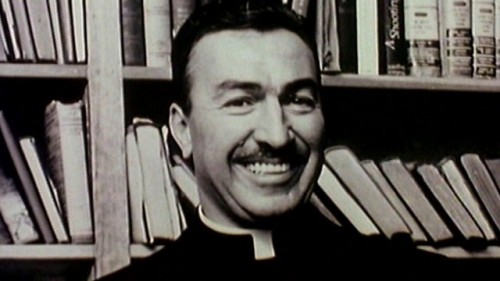This month, we’ve celebrated the birth and legacy of Rev. Dr. Martin Luther King, Jr., who has become the face of African American civil rights in the United States and human rights worldwide. While there is much of King’s legacy that remains under appreciated, particularly his post-1963 “I Have a Dream” speech critiques of capitalism and worker’s rights protests, there is also room to explore the influence of lesser-known Civil Rights advocates and activists.
Rev. Rep. Adam Clayton Powell, Jr. (b. 1908 – d. 1972) is one such figure who certainly deserves further re-examination. For three decades of the 20th century, Adam Powell was the central grassroots organizer and political figure representing the black community in Harlem, New York, where Seventh Avenue bears his name today. He was one of the most productive U.S. Congresspersons of his time, churning out a host of legislation measures for federal civil rights programs as the chair of the Committee on Education and Labor earning him the nickname “Mr. Civil Rights.”

The privileged son of a Baptist preacher who eventually became pastor of Abyssinian Baptist Church, Powell was devilishly charming, fearlessly outspoken, and, according to some, an opportunist who helped shape Harlem community politics, irritated his colleagues in Congress, and inspired a new generation of Black Power activists.
Powell’s introduction to local politics in Harlem came after the rapid rise and decline of Marcus Garvey’s Universal Negro Improvement Association (UNIA). The UNIA was a transnational mass movement started by Garvey, and by the height of the Harlem Renaissance in the 1920s the organization had hundreds of divisions worldwide. It was crafted around notions of black self-determination and empowerment, racial uplift, grassroots membership, and had plans to create an industrial global economy between black people in the United States, the Caribbean, and Africa. Garvey’s race-first political consciousness is widely acknowledged to have influenced subsequent black-led social movements, especially struggles for African independence; Malcolm X, whose parents were UNIA members, and the Nation of Islam; and the Black Power Movement.

Although Powell was not a formal member of the UNIA, Garvey’s black nationalist messages of racial uplift and economic justice were infused throughout Harlem’s vibrant and diverse public sphere, and undoubtedly influenced Powell’s political consciousness. Powell heralded Garvey as the most important black leader of the 20th century, and expanded Garvey’s black nationalism to an international perspective. It is important to place Powell within the context of Garveyism, especially when considering his own organizing in Harlem during the Great Depression. Adam and members of the Abyssinian congregation rallied against workplace discrimination in several industries, hosted soup kitchens, directed mass meetings and rent strikes, and fought for improved conditions for blacks at the Harlem Hospital. Their picketing of department stores and the public transportation system was framed under the slogan “Don’t Buy Where You Can’t Work.” These protest tactics and the central role played by the church served as important antecedents for the Civil Rights Movement of the 1950s-70s.

This social activism formed the basis of Powell’s leveraging of institutional power when in 1945 he became the Democratic representative for Harlem in Congress. His background as a charismatic preacher who inherited his father’s congregation, reputation as a lady’s man, and fiery speech against racism made Powell almost princely in Harlem; and he easily won every election for the congressional seat until finally losing in 1970. In Congress, each piece of legislation that passed Powell’s desk was amended to include an anti-segregation clause that denied federal funding to any agencies practicing discrimination. He was instrumental in constructing the 1964 Civil Rights Act, advocating for voting rights, and ending segregation in the armed forces. At the height of his tenure in the early 1960s, legislation he produced included bills to provide school lunches, education and training for the hearing impaired, federal financial aid to colleges and universities, and increasing the minimum wage. Powell used his position as chair of the Committee on Education and Labor to not only represent the black community in Harlem but in the United States generally; he is often described as one of the most powerful men in the country during his tenure in Congress. His success was often overshadowed however, by controversy, including misappropriation of funds and frequent absenteeism for dalliances and exotic vacations, resulting in the House removing his chairmanship in 1967.

Representative Powell looks on as he is prevented from taking his Congressional seat in January, 1967. Source: The New York Times
Adam Powell’s openly defiant personality put him at odds with the passive resistance philosophy of the Civil Rights Movement; and his ego was at times threatened by emerging leaders like Martin Luther King, Jr. Rather, Powell embraced student activists like Stokely Carmichael who used Black Power as a political philosophy to reinvigorate Garvey-influenced nationalist ideas, assert cultural and racial pride, and to critique the slow progress of the Civil Rights Movement.

Powell and Student Nonviolent Coordinating Committee activist Stokely Carmichael (Kwame Ture)
Powell’s international politics also were aligned with race-based consciousness, grounded in the ethos for self-determination, independence, and pan-African ideals. He attended the 1955 Bandung Conference, widely regarded as a critical moment in Third World politics and urged later President Eisenhower to disavow colonialism in Africa and Asia. As a supporter of Ghana’s first president Kwame Nkrumah, a contemporary of Malcolm X, and mentor to Kwame Ture (Stokely Carmichael), Powell was an important linkage between the early 20th century radicalism and the 1960s protest cycles. Further, he represented an important example of drawing on mass protest to inform electoral politics.

Powell, center, seated with President Nkrumah and Malcolm X
Other readings:
Hamilton, Charles V. 2002. Adam Clayton Powell, Jr.: the political biography of an American dilemma. New York: Cooper Square Press.

Pingback: Crystal Nicole Eddins